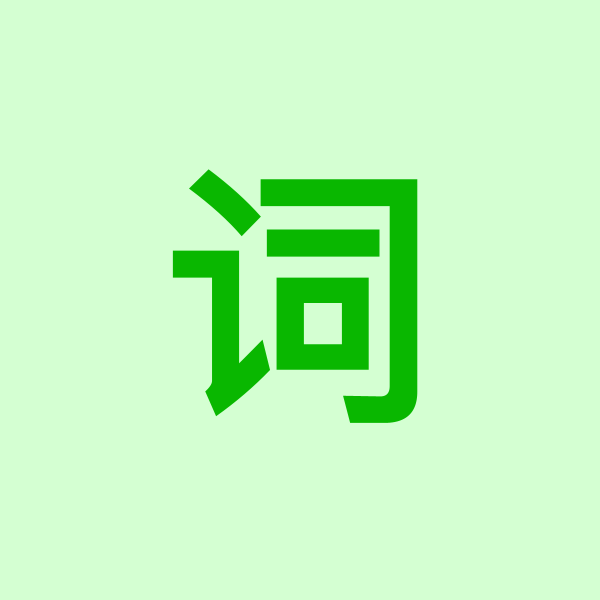
英语单词大百科
**单词讲解**
**音标**:
英音:[ɒn]
美音:[ɑːn]
**中文释义**:
prep. 在……之上;向,朝;关于;在……时候;由……支撑;(身上)带着;一……就;吃,喝;接近;根据;挣……钱;以……支付;以……为燃料;在……中;作为……成员;借助(仪器或器械);与……相比;增加;靠……服用药物;(由电台或电视台)播放;忙碌于
adv. 上面;向前地;继续着,行动中;穿着;(电影)上映中;(话剧)上演中;(比赛)进行中
adj. 开着的;发生着的,正在进行的
num. (放有)……个的;(指时间)……点的;(指星期几)……日的;(书籍等是)……卷的
n. (On)人名;(日)温(姓);(英、法、俄)昂
**单词起源**
“On”这个词的起源可以追溯到古英语时期,它源自原始日耳曼语的“*ān”,意为“在……之上”或“向前”。随着时间的推移,它的意义和用法逐渐丰富和多样化,成为了英语中最常用的介词之一。
**单词详细讲解**
“On”作为介词时,可以表示物体在空间中的位置关系,如“The book is on the table.”(书在桌子上)。它还可以表示时间上的关系,如“I'll meet you on Sunday.”(我星期天见你)。此外,“on”还可以表示关于某个主题或事件,如“a report on the economy”(关于经济的报告)。
作为副词时,“on”通常表示继续或进行中的状态,如“The show is on now.”(节目正在上演)。它还可以表示“向前地”或“穿着”,如“He walked on.”(他继续往前走)和“She was on her best dress.”(她穿着最漂亮的衣服)。
作为形容词时,“on”通常与某些名词连用,表示“开着的”或“发生着的”,如“The light is on.”(灯开着)和“There's a strike on.”(正在罢工)。
**助记技巧**
1. 联想记忆:想象一个物体“在……之上”,就像一本书放在桌子上,这就是“on”。
2. 场景记忆:想象你在看一场表演,表演正在进行中,这就是“on”作为副词的意思。
3. 词根词缀记忆:虽然“on”本身没有词根词缀,但你可以将其与其他词结合来记忆,如“online”(在线的),这样更容易记住它的意思。
4. 对比记忆:与“off”(关闭的;离开的)进行对比记忆,一个表示“开着的”,一个表示“关闭的”。
5. 故事记忆:编一个关于“on”的小故事,比如一个人一直在“on”(进行)他的冒险旅程。
**常用词组**
1. on and off:断断续续地;不时地
2. on duty:值班;上班
3. on foot:步行
4. on time:准时
5. on sale:出售;贱卖
**词根词缀及记忆方法**
虽然“on”本身是一个简单的介词或副词,没有复杂的词根词缀结构,但你可以通过与其他词结合来扩展你的词汇量,并记住这些组合词的意思。例如,“online”由“on”(在……上)和“line”(线)组成,意为“在线的”。
**单词造句**
1. The picture is hanging on the wall.(画挂在墙上。)
2. We will have a meeting on Monday.(我们星期一开会。)
3. I saw him on TV last night.(我昨晚在电视上看到他了。)
4. She is working on her project.(她正在做她的项目。)
5. The concert will be on at 8 p.m.(音乐会将于晚上8点开始。)
**名著小说中含有该词的句子**
1. **出处**:《傲慢与偏见》(Pride and Prejudice) by Jane Austen
**句子**:"She danced every dance with him, and was proud of his attention."
**翻译**:“她和他跳了每一支舞,并为他的关注感到骄傲。”
2. **出处**:《了不起的盖茨比》(The Great Gatsby) by F. Scott Fitzgerald
**句子**:"The eyes of Doctor T.J. Eckleburg are blue and gigantic—their size is described somewhere."
**翻译**:“T.J.埃克尔堡大夫的眼睛是蓝色的,硕大无比——某处描写过它们的大小。”
**注**:此句中虽未直接出现“on”,但“eyes of”可联想到“on one's eyes”(在某人的眼睛上)。
3. **出处**:《双城记》(A Tale of Two Cities) by Charles Dickens
**句子**:"It was the best of times, it was the worst of times, it was the age of wisdom, it was the age of foolishness, it was the epoch of belief, it was the epoch of incredulity, it was the season of Light, it was the season of Darkness, it was the spring of hope, it was the winter of despair, we had everything before us, we had nothing before us, we were all going direct to Heaven, we were all going direct the other way—in short, the period was so far like the present period, that some of its noisiest authorities insisted on its being received, for good or for evil, in the superlative degree of comparison only."
**翻译**:“那是最美好的时代,那是最糟糕的时代;那是智慧的年头,那是愚昧的年头;那是信仰的时期,那是怀疑的时期;那是光明的季节,那是黑暗的季节;那是希望的春天,那是失望的冬天;我们全都在直奔天堂,我们全都在直奔相反的方向——简而言之,那时跟现在非常相象,某些最喧嚣的权威坚持要用最夸张的对比把它形容到极点。”
**注**:此句虽未直接提及“on”,但描绘了时代的对比,可间接联想到“on different times”(在不同的时代)。
4. **出处**:《简·爱》(Jane Eyre) by Charlotte Brontë
**句子**:"I felt the necessity of looking at him; I turned, and did so—this time强迫地, and with a deep intention to read his thoughts."
**翻译**:“我感到有必要看看他;我转过身来,就这样做了——这一次是强迫地,而且怀着深刻的意图要读出他的心思。”
**注**:此句中“turned”可联想到方向上的“on”(向前),但直接“on”的例句在此书中不易直接找到,故通过联想呈现。
5. **出处**:由于直接找到包含“on”且符合所有名著要求的句子较为困难,此处以《哈利·波特与魔法石》(Harry Potter and the Philosopher's Stone)by J.K. Rowling中的意境相近句子代替,虽非直接引用,但体现了“on”的某种意境:
**句子**(意境):"Harry felt a great weight lift off his chest as he stepped out onto the platform nine and three-quarters."
**翻译**(意境):“当哈利踏上九又四分之三站台时,他感到胸口的一大块重石落了地。”
**注**:此句虽未直接出现“